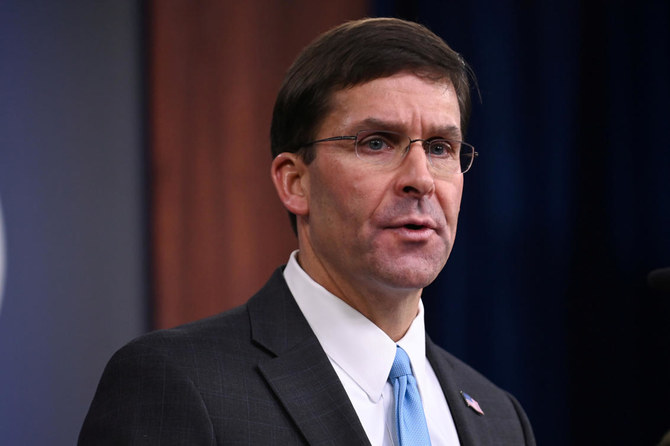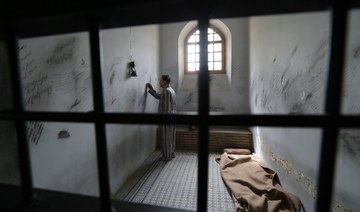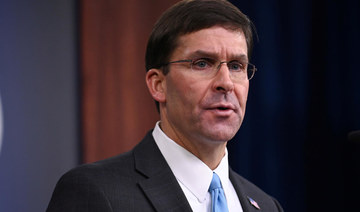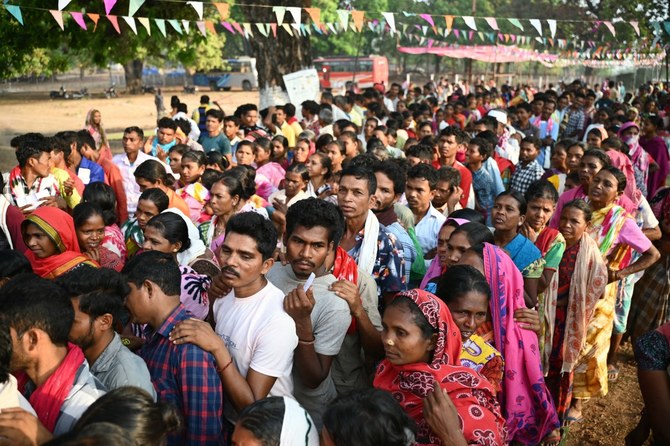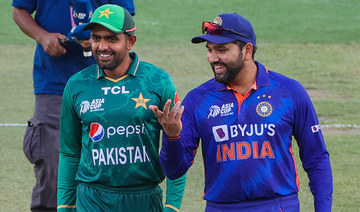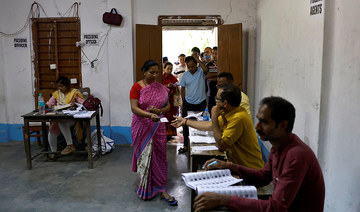DOHUK/KABUL: The Pentagon is considering keeping some US troops near oilfields in northeastern Syria alongside Kurdish-led Syrian Democratic Forces (SDF) to help deny oil to Daesh militants, Defense Secretary Mark Esper said on Monday.
US troops are crossing into Iraq as part of a broader withdrawal from Syria ordered by President Donald Trump, a decision that allowed Turkey to launch an offensive against the SDF which for years was a US ally battling Daesh.
More than 100 vehicles crossed the border into Iraq early on Monday from the northeast tip of Syria, where Turkey agreed to pause its offensive for five days under a deal with Washington.
The truce expires late on Tuesday, just after Turkish President Tayyip Erdogan is set to discuss next steps in the region at a meeting in Russia with President Vladimir Putin.
Speaking to reporters during a trip to Afghanistan, Esper said that, while the US withdrawal was under way, some troops were still with partner forces near oilfields and there had been discussions about keeping some of them there.
He said that was one option and no decision had been made “with regard to numbers or anything like that.” The Pentagon’s job was to look at different options, he added.
“We presently have troops in a couple of cities that (are)located right near that area,” Esper said. “The purpose is to deny access, specifically revenue to ISIS (Daesh) and any other groups that may want to seek that revenue to enable their own malign activities.”
Trump’s shift has opened a new chapter in Syria’s more than eight-year war and prompted a rush by Turkey and by the Damascus government and its ally Russia to fill the vacuum left by the Americans.
Trump’s decision has been criticized in Washington and elsewhere as a betrayal of Kurdish allies who had fought for years alongside US troops in a region rich in oil reserves and farmland.
The New York Times reported late on Sunday that Trump was now leaning in favor of a new military plan to keep about 200 US troops in eastern Syria near the Iraq border. The White House did not immediately respond to a request for comment.
“NECESSARY STEPS“
Turkey is seeking to set up a “safe zone” along 440 km of border as a buffer against the YPG militia, the main component of the SDF. Ankara sees the YPG as a terrorist group due to its links to Kurdish insurgents in southeast Turkey.
Erdogan has said Ankara will resume its assault when the deadline expires on Tuesday if the SDF has not pulled back.
Turkish sources said that the priority for Ankara was to see the YPG withdraw from a 120-km long strip where Turkish troops and their Syrian rebel allies have focused their assault, rather than the full border region.
They said it remained Turkey’s goal to establish the “safe zone” the full length of the border, which includes areas where Syrian and Russian troops have already moved in.
“We will take up this process with Mr.Putin and after that we will take the necessary steps” in northeastern Syria, Erdogan told a forum in Istanbul hosted by broadcaster TRT World on Monday, without elaborating.
Erdogan has also said Turkey will set up a dozen observation posts in the “safe zone,” prompting criticism from Iran.
“We are against Ankara’s establishing of military posts in Syria,” Iranian foreign ministry spokesman Abbas Mousavi told a weekly news conference on Monday broadcast live on state TV.
“The issues should be resolved by diplomatic means ... Syria’s integrity should be respected,” said Mousavi, whose country is a staunch ally of Syrian President Bashar Assad.
Echoing such concerns, Kremlin aide Yuri Ushakov said Russia believed long-term regional security could only be achieved by restoring Syrian unity and also by taking into account the interests of all the country’s ethnic and religious groups.
He reiterated that Putin and Erdogan would discuss Turkey’s military offensive in their talks on Tuesday in the Russian Black Sea resort of Sochi.
Russian Defense Minister Sergei Shoigu was quoted as saying that 12 Syrian prisons holding foreign militants as well as eight refugee camps had been left unguarded as a result of Turkey’s military operation.
Turkey’s nearly two-week old offensive has displaced some 300,000 people and led to 120 casualties among civilians and 470 among SDF fighters, the Syrian Observatory for Human Rights said on Sunday. Turkey says 765 terrorists but no civilians have been killed in its offensive.
On Monday, Reuters video images showed armored vehicles carrying US troops through the Sahela border crossing into Iraq’s northern province of Dohuk.
About 30 trailers and Hummers carrying heavier duty equipment crossed, with troops in cars coming through, an Iraqi Kurdish security source said.
The Turkish security sources said on Monday Kurdish YPG forces were advancing toward Al Hasakah, which is south of the proposed safe zone, adding some 125 vehicles had already left. They also said more than 80 Kurdish militants had been captured alive or surrendered to Turkish forces.



